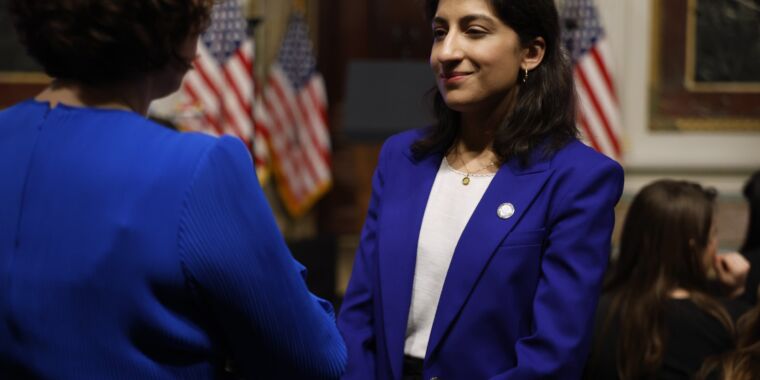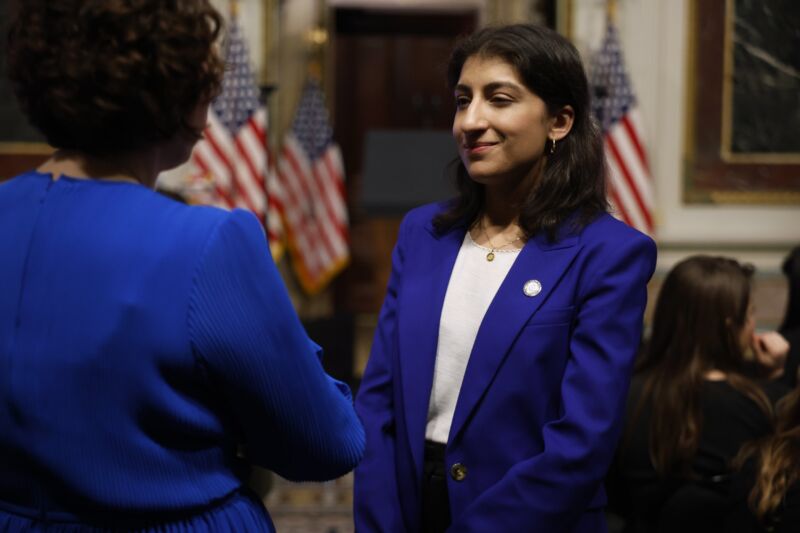Chamber of Commerce sues FTC in Texas, asks court to block ban on noncompetes
FTC vs. business lobby —
Noncompete clauses “benefit employers and workers alike,” Chamber tells court.

Getty Images | eccolo74
The US Chamber of Commerce and other business groups sued the Federal Trade Commission and FTC Chair Lina Khan today in an attempt to block a newly issued ban on noncompete clauses.
The lawsuit was filed in US District Court for the Eastern District of Texas. The US Chamber of Commerce was joined in the suit by Business Roundtable, the Texas Association of Business, and the Longview Chamber of Commerce. The suit seeks a court order that would vacate the rule in its entirety.
The lawsuit claimed that noncompete clauses “benefit employers and workers alike—the employer protects its workforce investments and sensitive information, and the worker benefits from increased training, access to more information, and an opportunity to bargain for higher pay.”
“Having invested in their people and entrusted them with valuable company secrets, businesses have strong interests in preventing others from free-riding on those investments or gaining improper access to competitive, confidential information,” the lawsuit said.
Lawsuit filed one day after FTC issued rule
The lawsuit came one day after the FTC issued its rule banning noncompete clauses, determining that such clauses are an unfair method of competition and thus a violation of Section 5 of the FTC Act. The rule is scheduled to take effect in about four months and would render the vast majority of existing noncompetes unenforceable.
The only existing noncompetes that won’t be nullified are those for senior executives, defined as people earning more than $151,164 a year and who are in policymaking positions. Existing noncompetes for all other workers would be nullified, and the FTC is prohibiting employers from imposing any new noncompetes on both senior executives and other workers.
“By invalidating existing noncompete agreements and prohibiting businesses and their workers from ever entering into such agreements going forward, the rule will force businesses all over the country—including in this District—to turn to inadequate and expensive alternatives to protect their confidential information, such as nondisclosure agreements and trade-secret lawsuits,” the Chamber of Commerce said in its complaint.
The Chamber argues that the FTC overstepped its authority. “The Commission’s astounding assertion of power breaks with centuries of state and federal law and rests on novel claims of authority by the Commission. From the Founding forward, States have always regulated noncompete agreements,” the lawsuit said.
The FTC says it can impose the ban using authority under sections 5 and 6(g) of the FTC Act. Section 6(g) authorizes the Commission to “make rules and regulations for the purpose of carrying out the provisions of” the FTC Act, including the Section 5 prohibition on unfair methods of competition, the FTC said in its rule.
FTC: “Our legal authority is crystal clear”
“Our legal authority is crystal clear,” an FTC spokesperson said in a statement provided to Ars today. “In the FTC Act, Congress specifically ’empowered and directed’ the FTC to prevent ‘unfair methods of competition’ and to ‘make rules and regulations for the purposes of carrying out the provisions of’ the FTC Act. This authority has repeatedly been upheld by courts and reaffirmed by Congress. Addressing noncompetes that curtail Americans’ economic freedom is at the very heart of our mandate, and we look forward to winning in court.”
The Chamber’s lawsuit said “the sheer economic and political significance of a nationwide noncompete ban demonstrates that this is a question for Congress to decide, rather than an agency.” If the FTC’s claim of authority is upheld, it “would reflect a boundless and unconstitutional delegation of legislative power to the Executive Branch,” the lawsuit said.
If the US District Court in Texas grants an injunction blocking the ban, the FTC could challenge the ruling in a federal appeals court.
Separately, a lobby group for cable TV and broadband companies issued a statement opposing the ban on noncompetes. “It is disappointing the FTC is poised to undercut small, independent, and rural broadband providers with a sweeping ban on non-competes,” said America’s Communications Association (formerly the American Cable Association). “This unjustified action will make it more challenging to provide quality service, crush competition and allow large incumbents to raid talent and obtain propriety information.”
Khan said yesterday that “noncompete clauses keep wages low, suppress new ideas, and rob the American economy of dynamism.” The ban “will ensure Americans have the freedom to pursue a new job, start a new business, or bring a new idea to market,” she said.
Chamber of Commerce sues FTC in Texas, asks court to block ban on noncompetes Read More »


